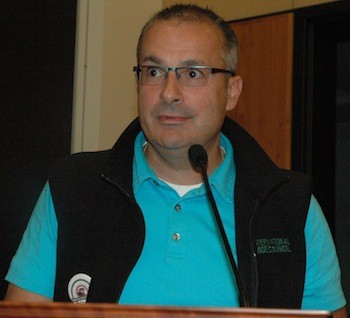ARLINGTON — The city is considering further limits on its marijuana producers and processers, after a public hearing that drew no comment from citizens.
Chris Young, speaking for the Community and Economic Development Department, presented a draft to the City Council Sept. 2, that would reduce the maximum square footage for such facilities from 15,000 to 10,000. City staff had already proposed limiting the number of licenses for such businesses to 14.
Young noted that previous drafts had allowed 10,000 square feet for production, as per state law, and 5,000 square feet for processing. However, because the state received more applications than it anticipated, those limits have been reduced, to maintain the maximum 2 million square feet allowed for marijuana production within the state.
“For most of our applicants, the production and processing would be conducted in one step, so it didn’t make sense to separate the two,” Young said. “Cleo, whose chief operating officer, Steve Ciccarelli, spoke to the council last month, would be mainly processing, extracting THC from the plants and bottling it for candy and other edibles.”
“Don’t edibles fall under medical and not recreational marijuana?” council member Debora Nelson asked.
“The state allows recreational edibles,” Young said.
Council member Jesica Stickles reiterated a suggestion she and Ciccarelli had made, to cap such businesses according to employment density, but Young acknowledged that city staff hadn’t “found the right language” for such a condition.
“If we cap the number of these businesses at 14, when this sunsets at the end of the year, we can revisit that,” Young said.
Council member Jan Schuette expressed concerns with the city’s legal standing to impose such limitations on a single type of business.
“If we do cap marijuana applicants according to the numbers of jobs they would create, are they going to say that we should do the same for lumber yards that don’t have certain numbers of employees?” Schuette asked.
“The city’s power of zoning is very broad,” city attorney Steve Peiffle said. “If there’s a legitimate, rational basis for it, it will probably be upheld. It only qualifies as discrimination if it’s against protected classes, which this is clearly not.”
Mayor Barbara Tolbert added: “Let’s not forget that the state is continuing to modify its regulations as well, so this won’t be the last time we tweak our own ordinances.”
The council is set to take action on this issue Monday, Sept. 15.







